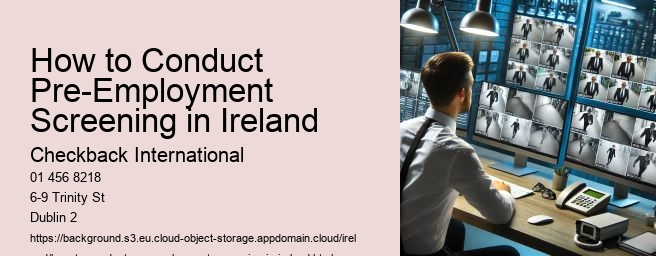

Can Candidates Request Copies of Their Own Background Screening Reports?
Can Employers Request Background Checks for Remote Workers Based Outside Ireland?
Key elements of the vetting process include:
Annual Background Checks: Should Your Irish Business Consider Them
Social media checks during pre-employment screening must follow specific legal requirements.
These international screenings need coordination with various national authorities and often involve multilingual document verification processes.
New technology changes how PSA vetting works.
What Are Some Common Errors During the Vetting Process?
3.The system helps Irish organizations participate in cross-border tenders
Companies use this report to make decisions about hiring candidates for security-sensitive positions.

Companies receive clear cost breakdowns before starting, which helps with budget planning and prevents unexpected costs during recruitment.
Fast processing helps organizations make timely hiring decisions while maintaining thorough screening standards.
Conclusion
Driving License Verification

The verification process typically takes up to 21 days, though it can be completed in as little as 10 days when candidates and previous employers provide timely responses.
Selecting a background check provider in Ireland depends on multiple key factors. Good background check services need to deliver complete and privacy-compliant solutions.
Client Experiences With Background Checking Services

Remote work background checks also review a candidate's experience with remote technology and data protection practices.
3.International screening includes checks against global blacklists, anti-fraud measures, and verification of overseas qualifications through accredited educational bodies.
Under Irish and European data protection regulations, pre-employment vetting services must maintain compliance measures to protect candidate information.

The European Criminal Record Check solution, operating in 26 EU states, provides verification through a central application process that combines checks from multiple jurisdictions into one report.
3.Data Entry Errors: Review all entries for accuracy.
You can request your own background check report. This helps you review the information about you and fix any errors found in the report.
Irish Business Compliance RequirementsA background check in Ireland involves reviewing a person's criminal, financial, or personal records to assess their suitability for a role or position.
The duration can vary but typically takes between 1-2 weeks, depending on the type and complexity of the check.
Garda vetting is a specific type of background check required in Ireland for individuals working with children or vulnerable adults, involving checks against police records.
Yes, you must obtain consent from the individual before conducting any background checks in Ireland.
Not for all employees, but certain sectors such as healthcare and education may require comprehensive checks.
It includes checking for any criminal convictions or offences recorded against the individual.
Yes, individuals can request their own background checks in Ireland for personal review or to prepare for employment screenings.
Skipping background checks can lead to hiring unsuitable candidates, which may result in legal and reputational risks.
Yes, police clearance is a general criminal record check, while Garda vetting is specific to roles involving vulnerable groups and includes more detailed investigations.
You can request transcripts or degrees directly from educational institutions or use third-party services that specialize in educational verifications.
Information about spent convictions, certain types of personal data, and other protected characteristics under GDPR is off-limits unless specifically relevant and lawful to access.
International checks may involve additional complexities such as different laws, languages, and longer processing times.
No, background checks do not affect your credit score as they do not involve a credit inquiry that would impact the score.
Best practices include securing data in compliance with GDPR, limiting access to authorized personnel, and ensuring data is stored for only as long as necessary.
It depends on the industry and role, but typically every 2-3 years or when significant changes occur in the individual’s role or responsibility.
While not specific by law, many IT positions require checks due to access to sensitive or proprietary information.
GDPR regulates the processing of personal data, ensuring that background checks are conducted in a lawful, fair, and transparent manner.
Yes, but it must be done lawfully and with the individual’s consent, considering the relevance to the role.
Penalties can include fines, legal actions, and reputational damage, depending on the severity of the non-compliance.
Remote work has increased the importance of thorough background checks, especially for those in positions of trust or handling sensitive data.
Best practices include conducting similar checks as for permanent staff, especially if they have access to sensitive or critical areas.
Ensuring fairness involves following consistent procedures, obtaining consent, and allowing candidates to dispute inaccuracies.
Yes, it’s recommended to tailor background checks based on the specific risks and requirements of each position.
Signs include transparency about services, compliance with legal standards, positive reviews, and strong data protection practices.
Handling involves assessing the relevance to the job, discussing findings with the candidate, and considering legal and ethical implications.